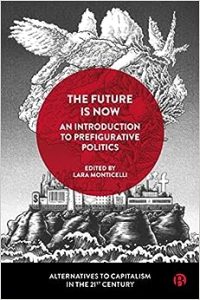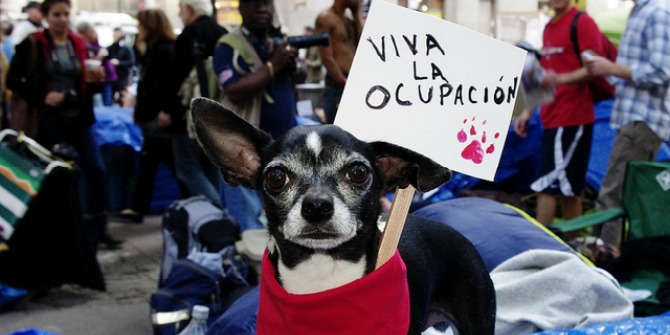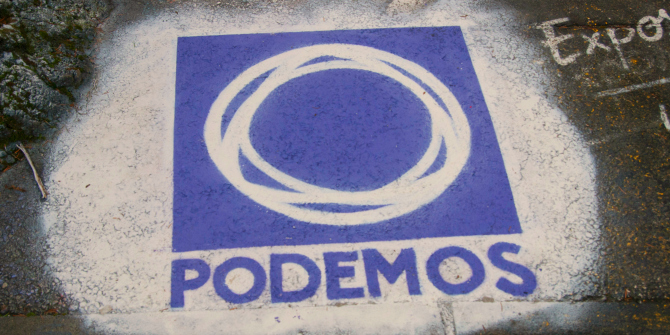The Future Is Now: An Introduction to Prefigurative Politics explores how prefigurative politics can help us to reimagine how we live in the face of climate change and ecosystems’ collapse. This stimulating volume, masterfully edited by Lara Monticelli, provides rich avenues for researching and enacting social change, writes Birgan Gokmenoglu.
The Future Is Now: An Introduction to Prefigurative Politics. Lara Monticelli. Bristol University Press. 2022.
 At a time of intersecting crises – capitalism, climate, energy, and the economy, to name a few – the challenge of how to build alternatives has become the defining question for those who strive for social transformation. While corporate capitalism seems to have the upper hand in shaping our collective futures, alternative social relations, economic models, and politics continue to offer hope. As one such alternative, The Future is Now brings prefigurative politics (commonly understood as a type of politics that represents and embodies, in the present, the society desired for the future) into the spotlight as a means of progressive social change, driven by both timely and timeless theoretical and political debates. Masterfully edited, empirically vibrant, and theoretically stimulating, this volume is essential reading for both scholars and activists.
At a time of intersecting crises – capitalism, climate, energy, and the economy, to name a few – the challenge of how to build alternatives has become the defining question for those who strive for social transformation. While corporate capitalism seems to have the upper hand in shaping our collective futures, alternative social relations, economic models, and politics continue to offer hope. As one such alternative, The Future is Now brings prefigurative politics (commonly understood as a type of politics that represents and embodies, in the present, the society desired for the future) into the spotlight as a means of progressive social change, driven by both timely and timeless theoretical and political debates. Masterfully edited, empirically vibrant, and theoretically stimulating, this volume is essential reading for both scholars and activists.
The challenge of how to build alternatives has become the defining question for those who strive for social transformation
The book’s 15 chapters are organised neatly into three interrelated parts: contextualising prefigurative politics, prefigurative politics in practice, and doing research on prefigurative politics. Starting with Arturo Escobar’s critical but hopeful foreword, we are impelled to think about building alternative futures and its challenges. From prefiguration as emancipatory pedagogy and praxis (De Vita and Vittori; Piccardi) to its relation to the futures of work (Dinerstein and Pitts), from the transnational permaculture movement (Centemeri and Asana) to Auroville in India (Clarence-Smith) and the Zapatistas in Mexico (Dinerstein), from debates around conceptualisation (Raekstad; Yates and de Moor) to challenges for research (du Plessis and Husted), the book draws together a rich collection of empirical cases, theoretical perspectives, and avenues for research.
Two themes particularly stand out for their critical interventions. First is the authors’ exploration of the state, which addresses the often-neglected relationship between prefigurative politics and the state, institutions, and institutionalisation. At the conceptual level, Paul Raekstad offers a much-needed overview of the history of prefiguration in Marxism and anarchism, focusing on arguments for and against taking state power. Luke Yates and Joost de Moor further provide the genealogy of the term prefiguration in academic literature from 1968 to 2020, suggesting a return to the origins of the concept to consider states or political parties as potential actors of prefigurative politics. Monticelli, while identifying prefiguration as avoidant of the state, stresses that representative, contentious, and prefigurative politics are not incompatible, providing radical municipalism as an example.
Monticelli, while identifying prefiguration as avoidant of the state, stresses that representative, contentious, and prefigurative politics are not incompatible, providing radical municipalism as an example
Davina Cooper’s afterword pulls on this thread to argue that there are multiple prefigurative actors, including states. Arguing against the “ethos of purity intent on remaining uncontaminated by power or compromise,” commonly assumed in studies and experiments of prefigurative politics, Cooper instead opens up “power” to cover “the power to act otherwise.” Eleonora Gea Piccardi illustrates this complexity in her chapter on Jineolojî’s praxis in Rojava. Here, women’s self-organised political education not only serves Rojava’s “depatriarchisation” and “matriarchalisation,” but also informs each institution and provides the basis for the institutionalised co-leadership system. The interweaving of autonomous organising and (self-)governance structures in Rojava chimes with Mikko Laamanen’s shift of focus from organisations to organising in his chapter on an alternative economy community, the Helsinki Timebank.
The tensions inherent in autonomous self-organisation in and against the capitalist state
Erik Mygind du Plessis and Emil Husted also consider “puritan ideals” of prefiguration a challenge, as an impossible standard that may set movements up for disappointment and failure. Studying Christiania Freetown, an autonomous, self-governed community founded in Copenhagen in 1971, Jilly Traganou writes about these tensions inherent in autonomous self-organisation in and against the capitalist state. In one of the most nuanced and critical chapters of the volume, Traganou argues that Christiania’s purchase and renting of the land from the Danish state in 2012 led to a “permutation” of autonomy for Christianites. She shows how practices of building “embodied infrastructures,” “communal knowledge,” and the commons – such as the community’s building its own water infrastructure or the construction and renovation of buildings – were essential to their prefigurative politics. The delegation of these practices to the Danish state (or the municipality), in turn, marked Christiania’s permutation from “insurgent autonomy” to an era of “regulated autonomy.” These are common pitfalls of maintaining prefigurative communities in cases where negotiation with the state is unavoidable.
The second theme is time. Monticelli, in her chapter on the ontological and epistemological distinctiveness of prefiguration, puts forward temporality as an integral feature of social change. She argues that prefigurative politics has a processual temporality, where change happens in the present, but develops slowly. Along with different mechanisms of change and approaches to the state, she shows how prefigurative politics’ temporality sets it apart from representative and contentious types of politics. Similarly, Francesca Forno and Stefan Wahlen take time as an intrinsic component of everyday life to argue that everyday temporalities, such as rhythms and repetition, are not only enacted, but constitute “a locus for change, extending the past into the future.” The relationship between the past, present, and future is another recurring theme (eg Komporozos-Athanasiou and Bottici), even if not always explicitly examined under the analytic lens of time.
Marianne Maeckelbergh shifts attention to the multiple temporalities of prefiguration and compares the alter-globalisation movement with occupation- and assembly-based movements. She describes how the former envisioned their actions in “process-time,” where the more fragmented and shorter events were tied together as part of a long-term process; whereas the latter movements’ focus on occupation merged the event with the process in “event-time,” leading to the perception that the movement was over once the occupations ended. She thus contributes a novel temporal perspective to the age-old question of how movements perceive success and failure.
[Ana Cecilia Dinerstein] draws on open Marxism, Bloch’s “multiversum” of different and overlapping temporalities, and indigenous understandings of time to contrast these with the linear historical time of modernity and the homogenising and synchronising force of global capitalism
In another chapter on multiple temporalities, Ana Cecilia Dinerstein writes on decolonising prefiguration through decolonising understandings of time and the possible. She draws on open Marxism, Bloch’s “multiversum” of different and overlapping temporalities, and indigenous understandings of time to contrast these with the linear historical time of modernity and the homogenising and synchronising force of global capitalism. Doing so, she urges us to educate hope to discover the latent futures in our present, and to struggle towards building concrete utopias that emerge “from, against, and beyond the material forces that govern capitalism.” I believe this call to hope and action sums up the volume as a whole.
The Future is Now makes significant interventions into the field of prefigurative politics and urges its readers to ask political questions.
The Future is Now makes significant interventions into the field of prefigurative politics and urges its readers to ask political questions. It offers a concise but expansive entry point for those unfamiliar with prefigurative politics, and multiple thought-provoking avenues for research and action for those more experienced in prefiguration. Readers interested in alternatives, social and political theory, global social movements, or transformative change will find this volume a treat.
Note: This review gives the views of the author, and not the position of the LSE Review of Books blog, or of the London School of Economics and Political Science. The LSE RB blog may receive a small commission if you choose to make a purchase through the above Amazon affiliate link. This is entirely independent of the coverage of the book on LSE Review of Books.
Main Image: Another77 on Shutterstock.







